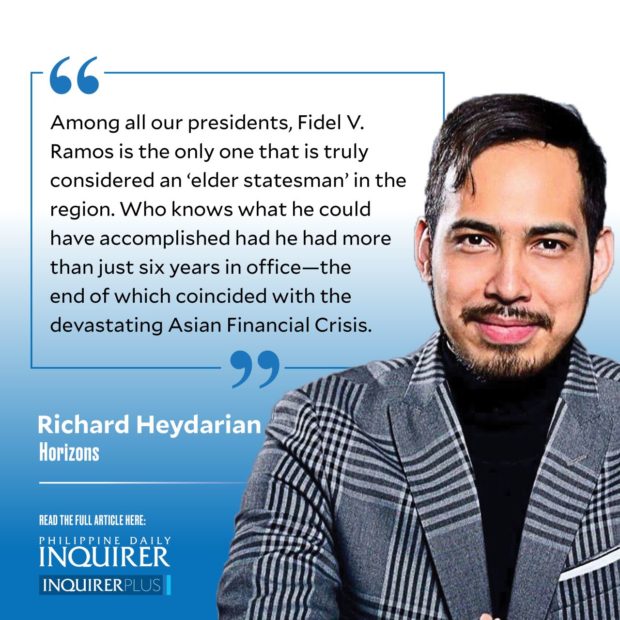Fidel Ramos: The politics of redemption
 Of all the Filipino presidents I managed to talk to in the past decade, one came closest to my ideal of a capable, hard-working, and patriotic leader needed for a fledgling democracy such as the Philippines.
Of all the Filipino presidents I managed to talk to in the past decade, one came closest to my ideal of a capable, hard-working, and patriotic leader needed for a fledgling democracy such as the Philippines.
Sure, Fidel V. Ramos was not perfect. His critics will point out, inter alia, his years-long position at the upper echelons of the Marcos dictatorship. Others will point out the deleterious impact of the aggressive privatization of state-owned enterprises throughout the 1990s.
It was also under his watch when the Marcoses managed to reestablish their micro-kingdom in the Ilocos region. More progressive detractors, meanwhile, will take issue with his decision to reestablish the American military footprint in our country through what would eventually become the Visiting Forces Agreement.
But, dear reader, make no mistake: Ramos was arguably the best president we have had in the past half a century. His administration was largely based on inclusive meritocracy (rather than nepotism), technocratic competence (rather than populist antics), and personal discipline and determination (rather than performative politics and inherited power).
Despite winning with the slimmest of margins in the 1992 elections, Ramos managed to consolidate our fragile democracy, which was on the brink of collapse. The Corazon Aquino administration had barely survived half-a-dozen coup attempts, with a plethora of insurgencies engulfing the nation; the new democratic regime desperately struggled to manage the debt and economic crises inherited from the Marcos dictatorship.
And that year, former first lady Imelda Marcos and former Marcos crony Eduardo “Danding” Cojuangco collectively won close to a third of total votes in the presidential elections. The democratic project faced its darkest hour.
Within just a few years, Ramos shunted unruly officers back into the barracks. With regular coups out of the picture, he gradually stabilized the economy, reduced poverty, attracted foreign investment, and placed the country on the path to becoming Asia’s new rising tiger economy under his “Philippines 2000” vision.
Ramos ably leveraged his special powers, granted by Congress, to end an electricity crisis, while bludgeoning rapacious monopolies in key sectors of the economy. On the foreign policy front, he simultaneously engaged and deterred a rising China by initiating military modernization at home, revitalizing defense ties with traditional allies, and seeking diplomatic support from the Association of Southeast Asian Nations (Asean).
A former soldier, Ramos, who served in the Korean and Vietnam Wars with distinction, also became a capable peacemaker, paving the way for the establishment of an autonomous Muslim-majority region in Mindanao. Communist rebels, meanwhile, lost much of their armed potency in the same period.
Aside from being our only protestant president so far, Ramos is also the only contemporary Filipino president who didn’t preside over or directly benefit from the creation of a political dynasty. None of his children, nor his wife, tried to monopolize elected office like a family business.
Among all our presidents, Ramos is the only one that is truly considered an “elder statesman” in the region. Who knows what he could have accomplished had he had more than just six years in office—the end of which coincided with the devastating Asian Financial Crisis.
At his core, Ramos believed in strong state rather than “strongmen.” What makes him even more special, however, is his redemptive politics. Throughout the decades, he turned against allies-turned-autocrats.
First came his decision to launch a risky coup against his distant relative, Ferdinand Marcos, thus paving the way for the 1986 Edsa People Power Revolution. Almost exactly three decades later, he courted controversy by endorsing Rodrigo Duterte for the presidency. Shortly after, however, Ramos criticized Duterte’s decision to bury the remains of the former dictator as an “insult” to Filipino soldiers and policemen. He also chastised Duterte’s anti-Western tirades by calling for an “interdependent” foreign policy, which secures the Philippines’ national interest through a network of alliances.
Most crucially, Ramos also warned against extrajudicial killings and the worsening climate of impunity under Duterte’s drug war, publicly calling on policemen to follow the “basic rule of engagement, which is you shoot to disable [dangerous suspects], but not to kill.” Until the very end, Ramos had the wisdom, conviction, and humility to redeem himself—and leave behind a colorful, largely commendable legacy.
rheydarian@inquirer.com.ph




















